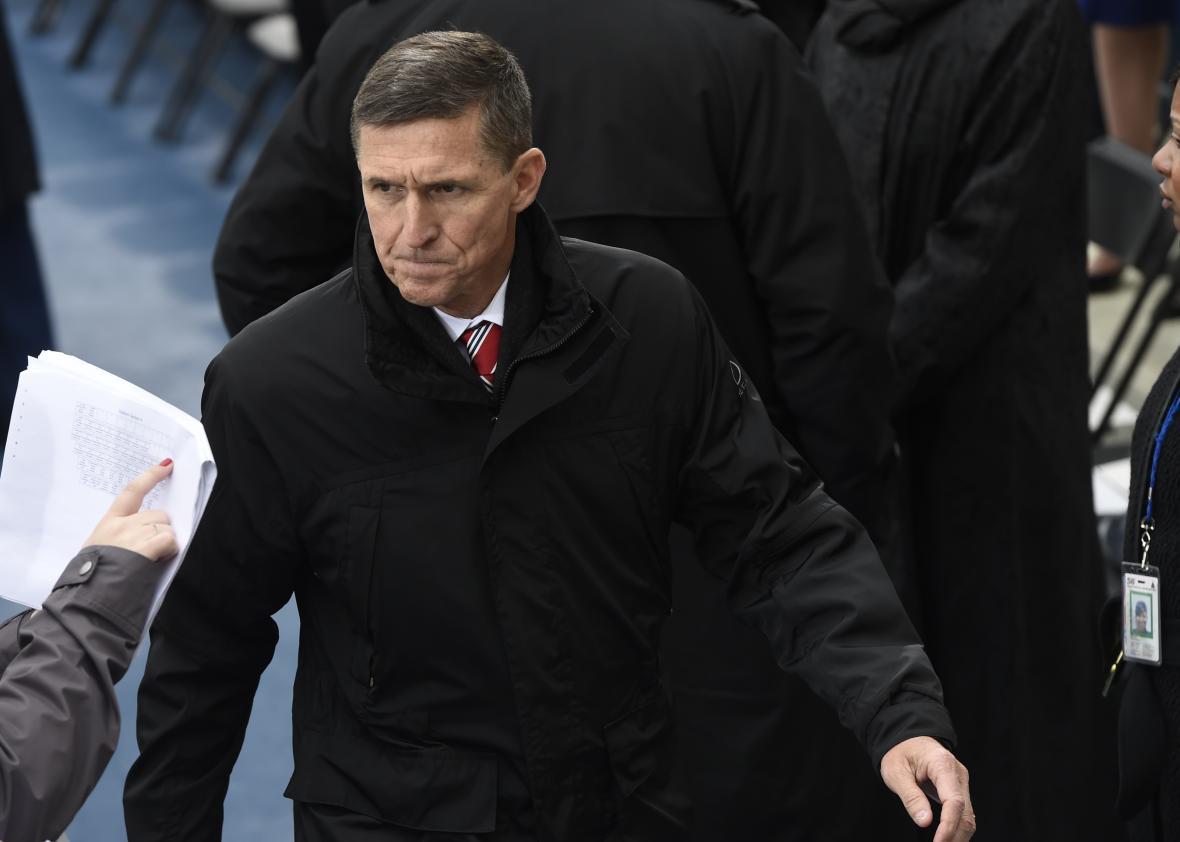Even for an administration that’s lurched from crisis to crisis since it took the reins of government in January, the past week has been extraordinarily dysfunctional. On Monday, national security adviser Michael Flynn resigned less than a month into his tenure. The news came after the Washington Post revealed that despite White House denials, Flynn had discussed U.S. sanctions against Russia with that country’s ambassador in the month before Donald Trump took office, an apparent violation of the Logan Act.
Flynn had also misled Vice President Mike Pence on the nature of those calls, leading Pence to defend Flynn on national television and state unequivocally that the now-former national security adviser had not discussed sanctions. Complicating matters, or worsening them, is the fact that Flynn was a person of concern for the Justice Department, who weeks ago warned the White House that he—having lied about these communications—was vulnerable to Russian blackmail. The fact of this warning calls Trump himself into question, given what he said to reporters after being asked about the Washington Post report. “I don’t know about that. I haven’t seen it,” he said while on Air Force One. “What report is that? I haven’t seen that. I’ll look into that.”
Topping off all of this is the revelation that during the campaign, key Trump aides were in contact with the Russian government, which directly contradicts assertions from Pence, who told CBS News there had been no communication between Russians and the campaign, and that, to suggest otherwise, “is to give credence to some of these bizarre rumors that have swirled around the candidacy.”
Given the implications—an American presidential administration potentially compromised by a foreign power—this swirl of questions around Trump, his campaign, and the Russian government demands a thorough investigation. And yet, Congress is all but missing from the equation. Neither the House of Representatives nor the Senate shows any interest in investigating the mounting questions and scandals within the Trump White House. This has less to do with merits and more to do with partisan loyalty. Although some Republicans see the need for more information—Iowa Sen. Chuck Grassley joined California Sen. Dianne Feinstein in requesting a briefing on Flynn’s activities—most have taken a “see no evil” approach to the administration, turning a blind eye to its dysfunction if it means they can advance an agenda.
This isn’t idle speculation. Republican lawmakers had already been willing to ignore the president’s statements and controversies as long as he backed their priorities. “There’s a widely held view among our members that, yes, he’s going to say things on a daily basis that we’re not going to like,” Sen. John Thune of South Dakota said to the New York Times, “but that the broad legislative agenda and goals that we have— if we can stay focused on those and try and get that stuff enacted—those would be big wins.”
This has extended and will continue to extend beyond outrageous rhetoric to matters of serious consequence. And so, in the wake of the Flynn revelations, Republican leaders have signaled their disinterest in pursuing new or expanded investigations. “The Intelligence Committee is already looking at Russian involvement in the election,” said Senate Majority Leader Mitch McConnell. “They can look into whatever they choose to.”
House Speaker Paul Ryan was similarly reluctant. “I think we need to get all of that information before we prejudge anything,” he said, either forgetting that the point of an investigation is to collect that information or admitting that House investigations—at least under Republican leadership—are punitive rather than genuinely investigative.
Kentucky Sen. Rand Paul was more explicit than most, openly declaring that the party’s legislative agenda is more important than resolving the questions around Trump and the Russian government. “I just don’t think it’s useful to be doing investigation after investigation, particularly of your own party,” he said on a recent edition of the Kilmeade and Friends radio show. “We’ll never even get started with doing the things we need to do, like repealing Obamacare, if we’re spending our whole time having Republicans investigate Republicans. I think it makes no sense.”
The White House is embroiled in what might be one of the most serious political scandals since Watergate, and the Republican Congress is absent—it has voluntarily abdicated its role. Americans believe their system runs on checks and balances, but those checks require the will to act. Without that, they’re dead letters. And to that point, it’s unclear if the GOP majority will ever take up its responsibilities. Under normal circumstances, a president’s deep and growing unpopularity is enough of a push to force his party to act. But while Trump is disliked by the broad public, he’s still in the stratosphere with GOP voters. It’s an open question if Republicans are interested in actual oversight, but even if they are, pro-Trump political pressure may pose an impossible obstacle.
Not that this excuses the Republican Party or its leaders. In their relentless drive for tax cuts and “small government,” Republicans have embraced an unqualified, unstable authoritarian with contempt for the basic values and norms of American democracy. They have facilitated the potential subversion of our government by foreign forces and empowered a dangerous ideology of racial and religious exclusion. However this ends, whatever happens with Trump and his movement, the GOP will bear the brunt of the blame.
